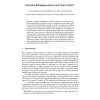Free Online Productivity Tools
i2Speak
i2Symbol
i2OCR
iTex2Img
iWeb2Print
iWeb2Shot
i2Type
iPdf2Split
iPdf2Merge
i2Bopomofo
i2Arabic
i2Style
i2Image
i2PDF
iLatex2Rtf
Sci2ools
122
click to vote
ECML
2007
Springer
2007
Springer
Statistical Debugging Using Latent Topic Models
Abstract. Statistical debugging uses machine learning to model program failures and help identify root causes of bugs. We approach this task using a novel Delta-Latent-Dirichlet-Allocation model. We model execution traces attributed to failed runs of a program as being generated by two types of latent topics: normal usage topics and bug topics. Execution traces attributed to successful runs of the same program, however, are modeled by usage topics only. Joint modeling of both kinds of traces allows us to identify weak bug topics that would otherwise remain undetected. We perform model inference with collapsed Gibbs sampling. In quantitative evaluations on four real programs, our model produces bug topics highly correlated to the true bugs, as measured by the Rand index. Qualitative evaluation by domain experts suggests that our model outperforms existing statistical methods for bug cause identification, and may help support other software tasks not addressed by earlier models.
Bug Topics | ECML 2007 | Machine Learning | Model | Usage Topics |
Related Content
| Added | 07 Jun 2010 |
| Updated | 07 Jun 2010 |
| Type | Conference |
| Year | 2007 |
| Where | ECML |
| Authors | David Andrzejewski, Anne Mulhern, Ben Liblit, Xiaojin Zhu |
Comments (0)

